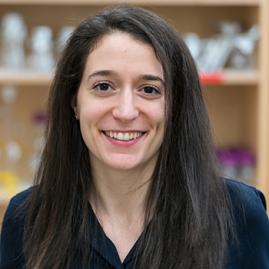
Tami Lieberman joined the MIT faculty in January 2018. She leads a computational and experimental research group focused on uncovering the principles governing colonization, niche range, and personalization in the human microbiome.
Tami trained in molecular biology and mathematics at Northwestern University, where she conducted research in the laboratory of Jon Widom and was funded by a Barry M. Goldwater Scholarship. She then earned a Ph.D. in Systems Biology from Harvard University, where she conducted research in Roy Kishony’s laboratory. During her graduate research, Tami developed new genomic approaches for understanding how bacteria evolve during infections of individual people. As a postdoc in Eric Alm’s lab at MIT, she further developed and applied these genomic approaches to understand the microbes that colonize us during health. Tami has also made contributions to our understanding of antibiotic resistance, including the co-invention of a new platform for visualizing evolution in real time. Her work has been covered in the popular press, including online coverage from The Atlantic, The Wall Street Journal, National Geographic, The Boston Globe, and ArsTechnia.
Research
Rational microbial-based therapies have the potential to treat a wide range of diseases and promote wellness. However, we remain severely limited in our ability to employ such therapies, as we cannot predict which bacterial strains have the potential to stably colonize an individual. My lab seeks to close this knowledge gap, developing an understanding of how individual species and strains behave in the human microbiome—including the selective pressures they face, niche ranges, survival strategies, and the degree to which they adapt to individual people.
A key approach in the lab is evolutionary retrospective studies of commensal species at the whole-genome level. We leverage the mutations that bacteria accumulate during colonization of individual people and evolutionary inference methods to infer past migrations within and across body sites, selective pressures faced by bacteria in vivo, and the molecular strategies used to adapt to these pressures. Crucially, these inferences can be performed without longitudinal studies, because bacterial strains diversify within hosts to form co-existing lineages that preserve a record of their natural history within the host. Other favored approaches include high-throughput culturing and experiments, computational tool development, and interrogation of spatial structure. When possible, we focus on the human environment, in order to rapidly translate discoveries from these complex ecosystems.
In the long term, we are optimistic that these studies will help us predict which therapeutic strains and co-administered treatments (prebiotics) provide the most potential for colonization, understand the degree to which each person’s microbiome requires personalized treatment, and predict how the future evolution of a strain will impact its community and host.
For more information please visit http://lieberman.science/?#
